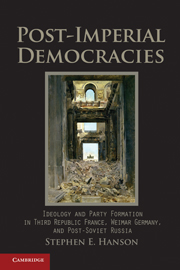
-
Select format
-
- Publisher:
- Cambridge University Press
- Publication date:
- June 2012
- July 2010
- ISBN:
- 9780511781391
- 9780521883511
- 9780521709859
- Dimensions:
- (228 x 152 mm)
- Weight & Pages:
- 0.54kg, 306 Pages
- Dimensions:
- (228 x 152 mm)
- Weight & Pages:
- 0.42kg, 306 Pages
You may already have access via personal or institutional login
Book description
This book examines the causal impact of ideology through a comparative-historical analysis of three cases of 'post-imperial democracy': the early Third Republic in France (1870–86); the Weimar Republic in Germany (1918–34); and post-Soviet Russia (1992–2008). Hanson argues that political ideologies are typically necessary for the mobilization of enduring, independent national party organizations in uncertain democracies. By presenting an explicit and desirable picture of the political future, successful ideologues induce individuals to embrace a long-run strategy of cooperation with other converts. When enough new converts cooperate in this way, it enables sustained collective action to defend and extend party power. Successful party ideologies thus have the character of self-fulfilling prophecies: by portraying the future polity as one organized to serve the interests of those loyal to specific ideological principles, they help to bring political organizations centered on these principles into being.
Reviews
'In many respects, Stephen E. Hanson's intellectually provocative and conceptually innovative study is an attempt to refute the argument … that ideology would fade away in our post-industrial, postmodern, post-utopian and post-historical age.'
Source: The Times Literary Supplement
Contents
Metrics
Altmetric attention score
Full text views
Full text views help Loading metrics...
Loading metrics...
* Views captured on Cambridge Core between #date#. This data will be updated every 24 hours.
Usage data cannot currently be displayed.
Accessibility standard: Unknown
Why this information is here
This section outlines the accessibility features of this content - including support for screen readers, full keyboard navigation and high-contrast display options. This may not be relevant for you.
Accessibility Information
Accessibility compliance for the PDF of this book is currently unknown and may be updated in the future.


